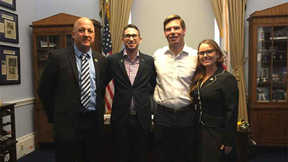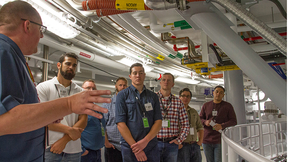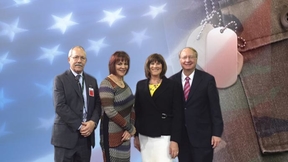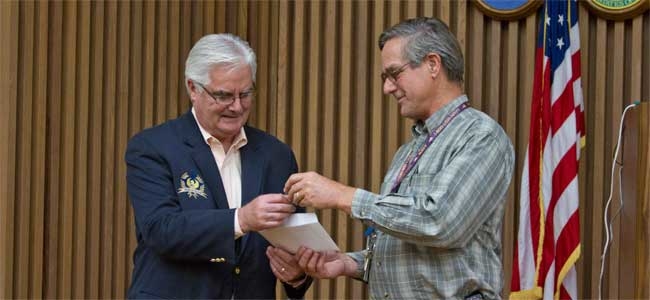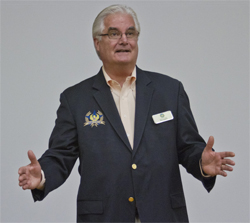'Sentinels' seeking opportunities for wounded veterans
Conklin, chairman and CEO of the Sentinels of Freedom Scholarship Foundation , spoke at the Lab Monday about the non-profit organization he founded in 2004, whose mission is to help permanently disabled veterans become more productive and self-sufficient members of their community. Sentinels targets highly motivated men and women who are amputees, paraplegic, blind, deaf or badly burned.
A four-year scholarship program, Sentinels helps veterans pursue bachelors and often master's degrees, with the ultimate goal of securing employment in a chosen field. In the process, the organization helps secure housing and any additional medical equipment or assistance that may be needed. "We are here to help them shed their military skins," Conklin said.
Conklin said the selection process begins with personal visits to military hospitals. "The first year, I wanted to take them home with me," he said about visiting the returning soldiers. The best case, he said, is to integrate a veteran into a community near their hometown. Sometimes, however, it may be necessary for them to relocate miles away; currently, the program reaches across the country.
Since its inception, the Sentinels of Freedom Scholarship Foundation has awarded 116 scholarships, with 72 veterans currently in the program and 44 who have graduated.
The program requires a lot of logistics and monitoring Conklin explained. "We do not advertise, use TV or radio," he said about promotional activities. "We don't spend our investors' money that way. We run a tight ship." Rather, he said, the organization accepts donations, holds fundraisers, has a low overhead, and employs few, relying mostly on the generosity of volunteers' time.
"I am often asked: 'How much time will it take (to volunteer)?'" The answer is: 'One golf game a month,'" he chuckled.
Conklin noted that although large corporations -- like Chevron and AT&T -- are essential to employing sentinels, there are also many ways that everyday citizens can demonstrate their generosity by volunteering to be mentors or personal coaches.
The Lab has a personal experience with the Sentinels of Freedom program having hired two veterans in the past. Conklin had praise for the Lab employing not one but two vets. Even if a company can hire one sentinel, it is a big help, he said. One sentinel, one victory at a time.
The talk was sponsored by the Laboratory Armed Forces Veterans Association (LLLAFVA), the Strategic Diversity Program Office and the Office of Strategic Outcomes (OSO).
The event concluded with a special presentation to Conklin who was awarded a donation of $1,000 for Sentinels of Freedom. The money was collected by the Lab's Veteran Association during Ride 9, an annual motorcycle ride to Site 300 on Nov. 8.
The Sentinels of Freedom is one of the organizations that Lab employees can donate to during the 2012 HOME (Helping Others More Effectively) Campaign (link to HOME Webpage) that benefits those in need in the community.
Contact
Linda A Lucchetti[email protected]
925-422-5815
Tags
VeteransFeatured Articles
